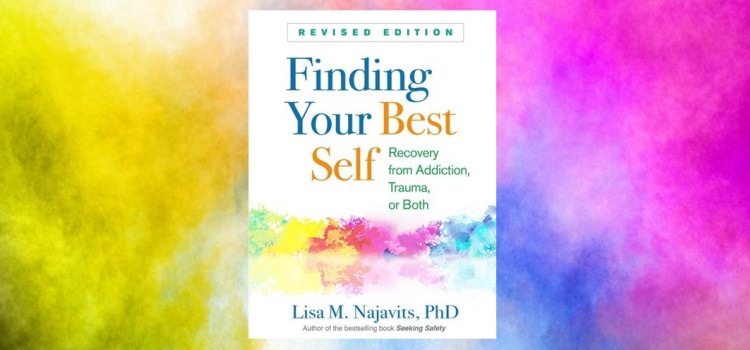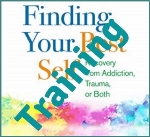What is a person’s best self?

By Lisa M. Najavits, PhD
What is a person’s best self? There are different possible versions of you, and life experiences can bring out better or worse versions. Addiction brings out worse versions. So does trauma – painful events such as child abuse, war, natural disasters and the many other tragedies that humans are subject to. Recovery brings out your best self.
There’s a wonderful exercise that originated in school systems about 15 years ago. It asks students to imagine their “hoped for” self and their “dreaded self” one year out. Students who imagined a “hoped for” self in terms of their academic work in the next school year and had specific strategies to achieve it did better in school months later than those who had the positive vision alone (Oyserman et al., 2004). Vision plus action leads to one’s best self.
I discovered this exercise while working on a book I had long wanted to write: a self-help book for addiction and/or trauma. I’ve worked in the field of addiction and trauma since the 1990s as a professor developing new models to help improve care and conducting clinical trials, and also as a therapist. It’s been incredibly moving to see the field grow and also to directly witness the inspiring recovery of so many people and also the dedicated work of so many different supports, both professional and peer-led.
The models I’ve developed, including Finding Your Best Self, are agnostic, while also strongly supporting the value of 12-step and other self-help groups. They have strong idealism and optimism, striving to build a sense of hope, but are not religious: Seeking Safety (L. M. Najavits, 2002b), A Woman’s Path to Recovery (L. M. Najavits, 2002a), Creating Change (L. M. Najavits, in press), and Finding Your Best Self (Lisa M. Najavits, 2019). All emphasize a public health perspective, aiming to offer accessible, low-cost options that can be done by anyone regardless of training or experience. The only requirement is a desire to help those who are struggling with addiction or trauma.
Finding Your Best Self was designed as self-help and can also be conducted by any peer, sponsor, counselor or professional, in group or individual format. It has 36 short chapters, each just a few pages. Examples are:
- How do people change?
- The world is your school
- Listen to your behavior
- Wish versus reality
- Possible selves
- The language of trauma and addiction
- Social pain;
- Why trauma and addiction go together
- Body and biology
- The culture of silence
- Tip the scales recovery plan
- Every child is a detective
- How to survive a relapse
- Identity– how you view yourself
- Perception– how others view you
- The decision to grow
- Dark feelings (rage, hatred, revenge, bitterness)
- Create a healing image
- How others can help—family, friends, partners, sponsors, counselors.
Chapters can be done in any order as each is independent of the others. Each chapter has exercises, self-reflection questions, and a Recovery Voices section in which someone with lived experience writes about how the chapter topic relates to their own recovery. The people who contributed to Recovery Voices include a wide array of addictions (substance and behavioral), trauma types, and diverse gender and cultural backgrounds. One woman is quoted below, from the chapter Self-Forgiveness.
* * *
Bridget – “I was carrying a lock in my heart”
“I’m a survivor of child sexual and emotional abuse. I’ve been addicted to food, spending, relationships, and emotional chaos. Self-forgiveness has been the hardest part of my recovery. It’s also the last piece I’ve put into place. What I’d say to somebody else is, know that you can do this; it can happen. But you really have to open your heart. And it may happen in such small steps that it’s hard to feel it. One thing I like about this chapter is how it says you need to let yourself feel the forgiveness. That’s the hardest part. I got it intellectually a whole lot sooner than I got it emotionally. I could feel it toward other people – I was a great caretaker – but I couldn’t feel it for myself. I tried a lot of things – religion, affirmations, positive psychology. I tried that exercise where you imagine how you’d talk kindly to a young child. I even tried to channel myself toward social change to help others, and that was a good thing, but it didn’t get to the bottom line, which is can I sit with myself? Can I be here with me? I know that when I draw that last breath, I want to be okay with me.
My dad was vicious. He was a working-class drunk – the devaluing, beating-you-down stuff. The thing I really relate to in other trauma survivors is the self-hatred, the total venom toward myself, like I don’t have enough worth to be on the planet. And with addiction, no matter what type it is, whether it’s alcohol, drugs, or any other behavior, you feel like people can always point a finger and say, ‘Well, you’re doing it to yourself.’ There’s so much stigma and blame, and you internalize that and think, ‘Yes, I’m the problem here.’ So the starting point for me was just to be aware of the negativity I was perpetrating on myself. And what I tell other people and what I try to remember myself is that it’s never too late to get out of hell. It’s never too late. No matter what age you are, even if you’re 80 years old, you can still get to the peace that comes with self-forgiveness and that’s so enormous.”
* * *
 I’ll be doing a webinar on Finding Your Best Self September 10, 2020 and also welcome questions at any time at Najavits@bu.edu.
I’ll be doing a webinar on Finding Your Best Self September 10, 2020 and also welcome questions at any time at Najavits@bu.edu.
Lisa Najavits, PhD is an adjunct professor, University of Massachusetts Medical School, and was on the faculty of Harvard Medical School for 25 years and a research psychologist at Veterans Affairs Boston for 12 years. Her major areas of work are addiction, trauma, co-morbidity, community-based care, development of new models, and clinical trials research. She is author of over 190 professional publications and various books. She was president of the Society of Addiction Psychology of the American Psychological Association; and is on various advisory boards including the Journal of Traumatic Stress; the Journal of Gambling Studies; the Journal of Dual Diagnosis, and Psychological Trauma. Her awards include the 1997 Young Professional Award of the International Society for Traumatic Stress Studies; the 1998 Early Career Contribution Award of the Society for Psychotherapy Research; the 2004 Emerging Leadership Award of the American Psychological Association Committee on Women; and the 2009 Betty Ford Award of the Addiction Medical Education and Research Association. She is a licensed psychologist in Massachusetts and conducts a therapy practice.

























Thank you so much for this informative post. I’m signing up!
Thank Lisa!!! Love this!!!! I was told as long as l acted the victim, l could never get sober. Self loathing was my go to. I deserve what is happening.